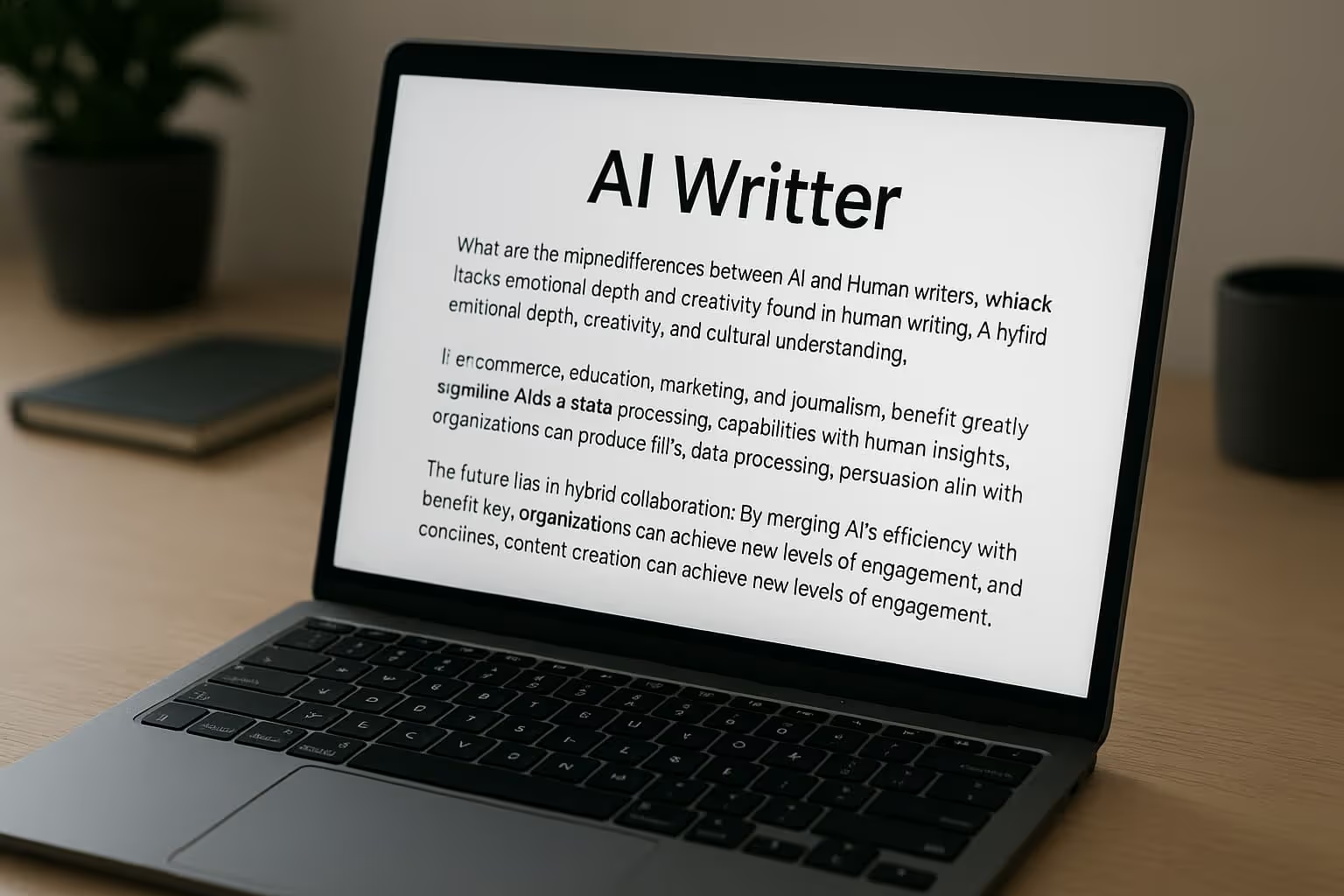AI vs Human Writers – What’s the Real Difference?

November 11, 2025

In an ever-evolving technological landscape, the debate between AI and human writers is a topic of significant intrigue. While both have their strengths and weaknesses, understanding the real differences is crucial for making informed decisions about content creation. With platforms like AI content writing proving increasingly popular, there's much to consider in this digital age.
The Fundamentals of Writing: Humans vs. AI
At its core, writing is an art, a craft honed over millennia, primarily by humans. Human writers bring emotion, culture, and personal experience to their work, imbuing it with depth and nuance. In contrast, AI writers such as those powered by software algorithms excel in speed and efficiency, completing tasks in a fraction of the time it would take a human.
Cognitive Abilities and Creativity
Humans are unparalleled in their cognitive abilities, particularly when it comes to creativity. Our ability to think abstractly, to feel deeply, and to connect seemingly disparate ideas is unmatched by AI. While AI can generate content that mimics human writing, its creativity is bound by pre-programmed algorithms, and it struggles with tasks that require emotional depth or cultural understanding.
The Practical Differences in Content Generation
The most apparent difference lies in productivity and consistency. AI excels in generating large volumes of content quickly, a feature indispensable for businesses aiming for rapid market entry or targeting keyword saturation. On the other hand, human writers thrive in crafting unique narratives, storytelling, and persuasive communication.
AspectHuman WritersAI WritersCreativityHigh, nuancedLimited, algorithm-basedSpeedModerateFastConsistencyVariedHighly ConsistentCostVariesCost-effectiveEmotional DepthRichLimited
Quality of Output
Quality remains a significant differentiator. While AI can produce grammatically sound articles, the prose often lacks the flair and depth characteristic of well-crafted human writing. Human writers are adept at crafting an engaging narrative that resonates with audiences, an area where AI still has much to learn.
Cost Implications and Economic Considerations
When it comes to cost, AI writing tools are generally more economical. Businesses seeking cost-effective solutions often turn to AI for its low entry barriers. However, when the task requires a personalized touch or involves intricate storytelling, the investment in human writers can yield more substantial returns by engaging audiences more profoundly.
Scalability and Flexibility
AI's ability to scale effortlessly makes it an attractive option for large-scale projects and businesses that require high volumes of content, such as product descriptions or news aggregation. In contrast, human writers excel in flexibility, adapting tone, style, and voice to suit specific audiences across diverse platforms.
The Future of Writing: Hybrid Approaches
The future might not be a competition between human and AI writers but rather a collaboration. By combining the creativity and emotional intelligence of humans with the scalability and efficiency of AI, content creation can reach new heights. Writers will likely continue to oversee AI-generated content, refining and infusing it with the depth only humans can provide.
Industries Benefiting from AI and Human Writers
Many industries, from e-commerce to education, stand to benefit from the synergy between AI and human writers. AI's ability to process and analyze data complements human insights, enabling more strategic decision-making in content creation.
Ultimately, the choice between AI and human writers depends on the specific needs and goals of an organization. While AI continues to transform various sectors, the irreplaceable depth, emotion, and creativity human writers bring to the table ensure their continued relevance in an AI-enhanced future.
FAQ
Q: What are the main differences between AI and human writers?
A: While AI excels in speed, scalability, and cost-efficiency, human writers bring emotional depth, creativity, and cultural understanding. AI produces consistent content quickly, but human writers create more engaging, relatable narratives.
Q: Is AI writing more cost-effective than hiring human writers?
A: Yes. AI tools are generally more affordable, making them ideal for businesses that need large volumes of content. However, human writers deliver higher-quality storytelling and emotional resonance, which can lead to stronger audience engagement.
Q: Can AI truly replicate human creativity?
A: Not entirely. AI can mimic writing patterns and generate structured text, but it lacks authentic imagination and the ability to draw from real-world emotions or experiences. Human creativity remains essential for originality and depth.
Q: Which industries benefit most from combining AI and human writing?
A: Industries such as e-commerce, education, marketing, and journalism benefit greatly. AI streamlines research and content generation, while human input ensures tone, storytelling, and persuasion align with audience needs.
Q: What does the future of content creation look like?
A: The future lies in hybrid collaboration. By merging AI’s efficiency with human creativity, organizations can produce high-quality, emotionally engaging, and data-informed content at scale.

Your Perfect SaaS Tool is Just a Click Away
Disclosure
you, but we only recommend SaaS tools we trust for small businesses.



















































































